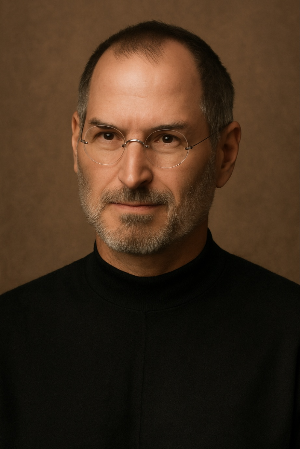
Steve Jobs (1955.2.24–2011.10.5)
Former Chairman of Apple’s Board of Directors / Former Director of The Walt Disney Company
Daily routine and philosophy about money
Steve Jobs is remembered by us as more than an entrepreneur; he is an icon of “innovation.”
Passing through Apple, Pixar, and NeXT, the philosophy he forged was not about simple products but about selling an “experience.” Yet his daily routine was, surprisingly, very simple and calm. He began his mornings with meditation, and the seemingly nonchalant, always-the-same outfit—black turtleneck and jeans—was itself the image of Jobs and reflected his frugal way of life. To avoid wasting energy and time on unnecessary decisions, his closet contained only identical clothes; his lifestyle was one of extreme “minimalism.”
He disliked unnecessary reporting in meetings and valued intuition. It is said that Jobs made decisions through emotion, design, and users’ reactions rather than numbers. More than countless board meetings or PowerPoint presentations, he placed greater importance on the concrete, sensorial question: “Can this truly move people?”
He was also very simple about money. In his younger years he had many fantasies about wealth, but over time he came to hold the belief that “money is only a tool.” In fact, even after becoming a billionaire, he maintained a frugal life and never boasted of his assets. Under the philosophy that “the most valuable assets are time and creativity,” he poured his energy solely into products that would leave a mark on the world.
(Indeed, Apple has moved users deeply and built a devoted fan base, and even now many people love Apple, emulate his fashion, and remember him.)
Favorite foods and the values contained in his way of eating
Steve Jobs was also famous for his extreme eating habits: in his youth he was a fruitarian, and there were periods when he lived on carrots and apples alone. It is said that this background partly carried over into the company name Apple, which shows how committed a vegetarian he was. He regarded eating as a philosophy linked to his identity; the act of “putting something in one’s mouth” went beyond mere nutrition to spiritual cleansing and an expression of will.
(Though such intuition may have aligned with his philosophy, it also led him to refuse hospital treatment early on, which is said to have sadly contributed to his passing sooner than he might have.)
He would sometimes eat only one meal a day or fast in order to maintain focus. Especially when there was a project requiring concentrated effort, he kept his mind clear by consuming only water and fruit for several days. Even during meals, if an idea came to him, he would stop, always take notes, or call a team member to give concrete feedback.
He is said to have gauged others’ sincerity through the dining table as well. From a counterpart’s eating manner, eyes, and attitude, he sought to read the person’s “essence,” and this sometimes functioned like a test when forming teams or choosing partners. For Jobs, food may not have been simple consumption but rather “self-discipline,” even a kind of practice.
Philosophy of love and human relationships
Steve Jobs’s relationships were complicated yet sincere. Because he was extremely honest with his emotions, he sometimes hurt those around him with harsh words and actions. But many say he did so because of his “obsession with perfection.” He demanded from others a level of immersion equal to what he expected of himself, which at times created severe conflict, yet in the end he proved himself through good results born of those processes.
In love, after twists and turns with a long-time partner, he married, and in his relationships with his children he often showed a very human side. In particular, the way he later acknowledged his first daughter, Lisa—whom he had not recognized at first—and worked to restore their relationship is often recalled by many as a scene that reveals his change and inner complexity.
Even the consummate perfectionist eventually learned to accept imperfection. He said, “People can change at any time,” and near the end of his life he strove to reconcile with those around him. Even while bedridden in his final stage, he spent time with his family and told his children, “Whatever you do, love does not change.”
Lessons modern people can learn
Like other celebrated figures, wasn’t Steve Jobs not merely a technology entrepreneur, but someone who proposed a “way of life” itself? His philosophy still inspires countless entrepreneurs, designers, and artists, and the question he posed—“If today were the last day of my life, would I want to do what I’m doing today?”—may be a message that tells us what is most important in life.
He was not a perfect person, nor did he walk a smooth path to the top, but his sincere desire to make things more beautiful has become a great gift that we continue to benefit from. What we can learn from his life is not a simple success story, but the courage to devote oneself to what one truly loves and to try to leave a meaningful trace.
When we look back, we might ask, “Is what I’m doing now truly what I want?” Have I ever been completely immersed in it—and am I immersed now?
Am I doing what I love? Have I ever been so absorbed in what I love that I looked at nothing else?
In Korea, it is a story that feels all the more enviable.



